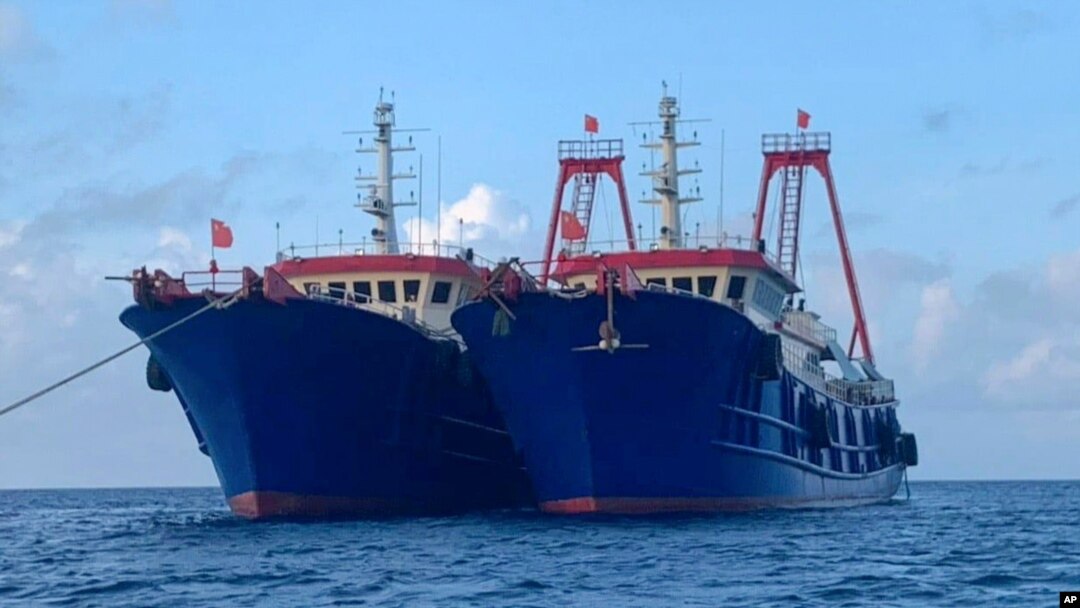Vietnam has joined the Philippines in vocally opposing a Chinese fishing fleet’s long stay at an unoccupied reef in a disputed Asian sea, and analysts say China is expected to back away and avoid a bigger dispute – but only for now.
A Ministry of Foreign Affairs spokeswoman in Hanoi said March 25 the “activities of Chinese ships…seriously violate Vietnam’s sovereignty.” A Vietnamese coast guard vessel was moored near Whitsun Reef in the disputed Spratly Islands last week, the Marine Traffic website showed.
Philippine defense officials began in early March asking that the Chinese ships leave. Manila’s Department of National Defense said March 28 a Philippine navy coast guard vessel and military plane were monitoring the reef.
SEE ALSO: Chinese 'Flotilla' in Contested Waters Further Sours Once-Upbeat RelationsChina would withdraw without a statement, probably citing the weather as a cause, said Collin Koh, a maritime security research fellow at Nanyang Technological University in Singapore. But it could easily return as part of a longer-term plan to control the now unoccupied islet as it has done to control other features in the sea, he said.
“Right now, you have the Vietnamese, you have the Filipinos now chiming in on this issue,” Koh said. “At least if you raise it in the public and capture the attention of the public, it would actually very likely force China to sort of roll back eventually, but the only thing is that even if the Chinese roll back now, there will be chances that they will return anyway.”
Brunei, Malaysia, the Philippines, Taiwan and Vietnam dispute all or part of Beijing’s claims to about 90% of the 3.5 million-square-kilometer sea that’s prized for natural resources including fisheries. China has the strongest armed forces among the six claimants, prompting others to look toward the United States for support.
Beijing has slowly occupied contested islets since the 1950s, sometimes with reclaimed land. Today its holdings support airstrips, hangars and radar systems. Chinese officials cite historical usage records to defend their access to the sea including tracts inside the 370-kilometer-wide exclusive economic zones of other countries.
“The continued presence of Chinese maritime militias in the area reveals their intent to further occupy features in the West Philippine Sea (South China Sea),” Philippine national defense Secretary Delfin Lorenzana said in a Facebook post Sunday. He said 44 fishing boats remained at Whitsun despite calm weather over the weekend.
The defense chief said China had “done this before” at Scarborough Shoal and Mischief Reef, two other islets in the disputed sea. Whitsun technically could be landfilled for development too, Koh said.
The Philippines protested China’s first structures on Mischief Reef in 1994 and 1995 and China waited another four years to add to its development there, sparking more fire from Manila. The reef supports Chinese aircraft hangars today. Chinese vessels occupied Scarborough Reef northwest of Manila in 2012 during a long standoff with the Philippines. They eventually took control of the prime fish-spawning shoal.
Some scholars say Philippine leaders protested loudly over the past month because they remember what happened to the other two islets. “I think the Philippines learned a lesson from Scarborough Shoal, from Mischief Reef,” said Alexander Vuving, a professor at the Daniel K. Inouye Asia-Pacific Center for Security Studies in Hawaii.
China for now intends to negotiate with Southeast Asian countries over a maritime code of conduct on how to handle any mishaps in the contested sea. Chinese officials hope more broadly to gain favor so rival claimants avoid turning again toward China’s superpower rival the United States for help. To aggravate Southeast Asian states now would frustrate these goals, Koh said.
SEE ALSO: China Uses Money, Diplomacy to Push Back Against US in Southeast AsiaPhilippine President Rodrigo Duterte has sought friendly links with China since he took office in 2016 but his armed forces and much of the public remain distrustful. Duterte’s predecessor won a world court arbitration case in 2016 against the legal basis for China’s maritime claims but China rejected the ruling. His government filed the suit in 2013.
Vietnam has been particularly outspoken against China over the maritime dispute since the 1970s and vessels from the two sides have gotten into several clashes, some deadly.
China has said the fishing boats moored near Whitsun have been there seeking shelter from dangerous weather.
“It’s just like a push-and-pull tactic by the Chinese government,” said Nguyen Thanh Trung, Center for International Studies director at University of Social Sciences and Humanities in Ho Chi Minh City. “If they see a strong protest, then they will step back a little bit, but they will get back again.”
The strength of the Philippine protest alongside Vietnam’s will blunt any immediate ambitions China has for Whitsun Reef, Vuving forecast.
“They will pull back and wait for the international storm to subside and wait for a little time when the international community looks elsewhere and then they would stealthily come back again,” Vuving said. “China is playing the long game.”


